牛津沪教版六上英语Unit 11 Trees 教案
牛津沪教版六上英语Unit 11 Trees 教学设计
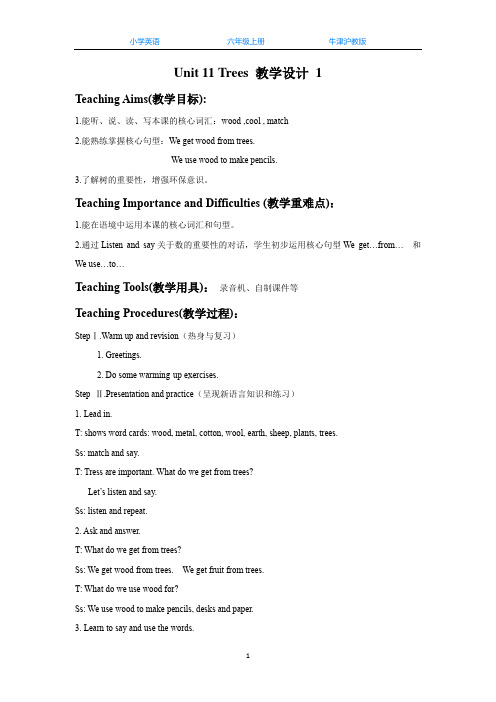
Unit 11 Trees 教学设计1Teaching Aims(教学目标):1.能听、说、读、写本课的核心词汇:wood ,cool , match2.能熟练掌握核心句型:We get wood from trees.We use wood to make pencils.3.了解树的重要性,增强环保意识。
Teaching Importance and Difficulties (教学重难点):1.能在语境中运用本课的核心词汇和句型。
2.通过Listen and say关于数的重要性的对话,学生初步运用核心句型We get…from… 和We use…to…Teaching Tools(教学用具):录音机、自制课件等Teaching Procedures(教学过程):StepⅠ.Warm up and revision(热身与复习)1. Greetings.2. Do some warming-up exercises.Step Ⅱ.Presentation and practice(呈现新语言知识和练习)1. Lead in.T: shows word cards: wood, metal, cotton, wool, earth, sheep, plants, trees.Ss: match and say.T: Tress are important. What do we get from trees?Let’s listen and say.Ss: listen and repeat.2. Ask and answer.T: What do we get from trees?Ss: We get wood from trees. We get fruit from trees.T: What do we use wood for?Ss: We use wood to make pencils, desks and paper.3. Learn to say and use the words.4. Watch the cartoon and learn to say the useful sentences.5. The pupils read the text carefully. And then try to do some exercises.Step Ⅳ.Consolidation(拓展延伸)T: What do we get from the environment? What do we use wood, glass and wool for? Please discuss in groups.S1: What do we use wood for?S2: We use wood to make desks and chairs.S3: What do we use glass?S4: We use glass to make mirrors.牛津沪教版英语六年级上册全册知识点汇总Module 1Getting to know each other一、核心词汇1.表示时间名词:month 一个月的时间;月份yesterday 昨天2.形容词:cute 可爱的pretty 漂亮的handsome 英俊的;帅气的famous 著名的;出名的healthy 健康的;有益于健康的unhealthy 不健康的;损害健康的3.动词:catch 逮住;捕捉spend 度过pick 采摘4.食物名词:hamburger 汉堡包fruit 水果pie 馅饼pizza 比萨饼cola可乐sandwich三明治vegetable 蔬菜chicken 鸡肉chocolate 巧克力5.表示动物名词:turtle 乌龟fly 苍蝇6.其他:during 在……期间everyone 每个人;所有人countryside 乡村;农村7.核心词组:grow up长大;成长junior high school 初级中学(be)born 出生summer holiday 暑假the Great Wall 长城the Palace Museum 故宫博物院Tian’an men Square 天安门广场go swimming 去游泳go to the museum 去博物馆go to the cinema 去电影院junior high school 初级中学do my homework 做我的家庭作业watch TV看电视visit my friends 拜访我的朋友a little 少量的fish and chips 炸鱼薯条二、了解词汇1.一些动词及过去式:go(去)—went do(做)—didhave/has(有)—had watch(观看)—watchedvisit(访问;探望)—visited am/is(是)—was are(是)—were2.一些食物名词:egg 鸡蛋bread 面包noodles 面条dumplings 饺子3.其他:menu菜单三、核心句型1.Her hair was short and her eyes were big. 她那时头发很短而且眼睛很大。
小学英语沪教牛津版六年级上册Unit 11《Trees》(第2课时)教学PPT

Do a survey. What can these trees give us? Complete the form.
trees
drink
wear
We get … from trees. We ... We … We …
tree
try
train
tr trousers
traffic triangle
dry dБайду номын сангаасink
dress
dr
draw
drop drive
Think and say
Trees are in danger. Why?
Think and say
What can we get from trees? What can we usually make from trees?
We get wood from trees. What do we use wood for? Give a report.
Give a report.
The bird flies to the factory. Bird: I’m looking for my friend Mr Tree. Where is he? Gate: The workers cut him into wood. They used the wood to make matches. Then they took the matches to a village.
沪教牛津版六上Unit 11 Trees 教案(公开课)
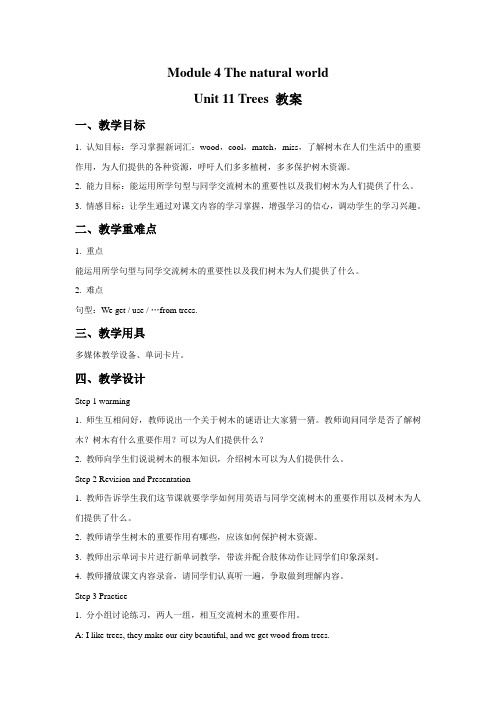
Module 4 The natural worldUnit 11 Trees 教案一、教学目标1. 认知目标:学习掌握新词汇:wood,cool,match,miss,了解树木在人们生活中的重要作用,为人们提供的各种资源,呼吁人们多多植树,多多保护树木资源。
2. 能力目标:能运用所学句型与同学交流树木的重要性以及我们树木为人们提供了什么。
3. 情感目标:让学生通过对课文内容的学习掌握,增强学习的信心,调动学生的学习兴趣。
二、教学重难点1. 重点能运用所学句型与同学交流树木的重要性以及我们树木为人们提供了什么。
2. 难点句型:We get / use / …from trees.三、教学用具多媒体教学设备、单词卡片。
四、教学设计Step 1 warming1. 师生互相问好,教师说出一个关于树木的谜语让大家猜一猜。
教师询问同学是否了解树木?树木有什么重要作用?可以为人们提供什么?2. 教师向学生们说说树木的根本知识,介绍树木可以为人们提供什么。
Step 2 Revision and Presentation1. 教师告诉学生我们这节课就要学学如何用英语与同学交流树木的重要作用以及树木为人们提供了什么。
2. 教师请学生树木的重要作用有哪些,应该如何保护树木资源。
3. 教师出示单词卡片进行新单词教学,带读并配合肢体动作让同学们印象深刻。
4. 教师播放课文内容录音,请同学们认真听一遍,争取做到理解内容。
Step 3 Practice1. 分小组讨论练习,两人一组,相互交流树木的重要作用。
A: I like trees, they make our city beautiful, and we get wood from trees.B: Yes. They are important and we use wood to make paper.A: ….B: ….2. 发挥想象力尝试写一句新颖、有趣的口号呼吁大家一起保护树木资源,同学们比一比谁的口号更与众不同。
六年级英语上册 Unit 11 Trees讲义 牛津上海版
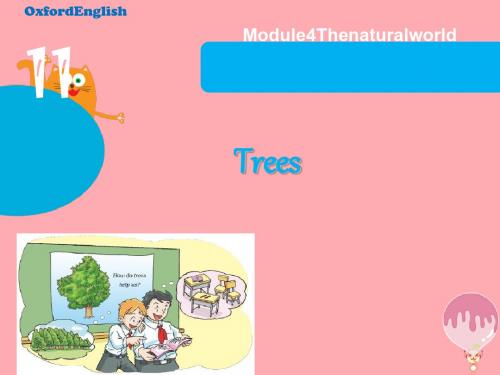
Spring comes. The bird comes back, but she cannot see the tree.
Bird: Where’s Mr Tree? Grass: Some workers cut him down and
took him to a factory.
The bird and the tree
Why/Why not? 5. What happened to the tree? 6. Where did the bird go? Did she meet the tree there? 7. What did the bird do at last?
The bird and the tree
Why/Why not? 5. What happened to the tree? 6. Where did the bird go? Did she meet the tree there? 7. What did the bird do at last?
The bird and the tree
OxfordEnglish
11
Module4Thenaturalworld
Trees
Peter: Joe:
Peter: Joe:
Peter: Joe:
Peter:
沪教牛津版英语六年级上册Unit 11 Trees
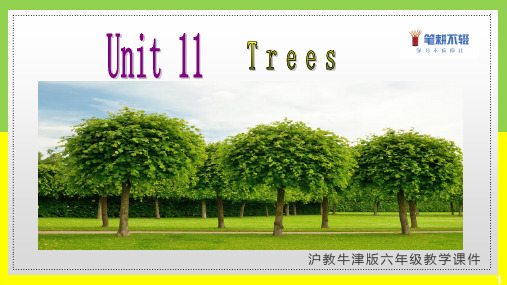
Peter: We use wood to make paper too.
Joe: Trees can keep the air clean. They can cool
the air too.
Peter: Really? That's wonderful. We should plant more
My sister gets the gift from her friend. 我的妹妹从她的朋友(那里)得到礼物。
……………………………………………………………………………………………………………………………………………………………………
6
……………………………………………………………………………………… ………………………………………………………………………………………
……………………………………………………………………………………… ………………………………………………………………………………………
彼得:我喜欢树。它们使我们的城市美丽。 乔: 是的。它们很重要。我们从树(那里)获得许
多东西。 彼得:我们从树(那里)获得水果。 乔: 我们从树(那里)获得木材。我们使用木材制作
铅笔、书桌和椅子。 彼得:我们也使用木材制作纸。 乔: 树可以使空气保持干净。它们也能使空气变凉。 彼得:真的吗?那太棒了!我们应该多种树。
……………………………………………………………………………………… ………………………………………………………………………………………
Байду номын сангаас
……………………………………………………………………………………………………………………………………………………………………
………………………………………………………………………………………………………沪……教……牛…津……版……六……年……级……教……学……课…件……… 1
牛津上海版(三起)六年级上册英语 Module 4 Unit 11 Trees【第二课时】优质教案
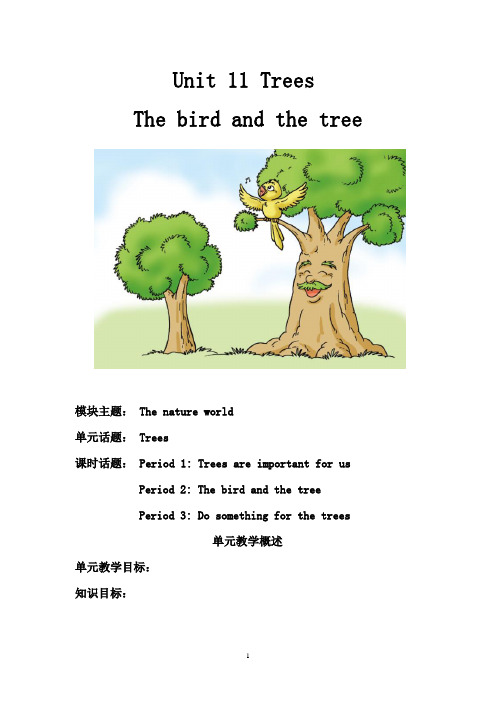
Unit 11 TreesThe bird and the tree模块主题: The nature world单元话题: Trees课时话题: Period 1: Trees are important for usPeriod 2: The bird and the treePeriod 3: Do something for the trees单元教学概述单元教学目标:知识目标:1.学生能听、说、读、写本单元核心词汇:wood ,cool ,match, miss, have to, cut...down ,look for,并能在语境中正确运用这些核心词汇。
2.能用句型We get...from... 描述人类如何从大自然中获取资源,能用句型We use...to....说明物品的用途。
3.能根据字母组合tr,dr, 的发音规律,拼读简单的单词。
语言技能:听:能听懂关于树的重要性的对话。
说:能用句型We get...from... 描述人类如何从大自然中获取资源。
用句型We use...to....说明物品的用途。
读:1.能熟练朗读关于树的重要性的对话。
2. 能分角色熟练朗读故事《小鸟和树》。
写: 能用本单元的核心词汇和句型描述树的重要性。
教学重点:学生对本单元核心词汇及句型学习和并在语境中正确运用这些知识点。
教学难点:熟练运用get...from...和use...to...,知道from后面接名词和代词,to在此时后面接动词。
情感态度目标:通过本单元的学习,学生能了解大树对人类和动物的重要性,知道我们应该合理的砍伐并使用树木,善待大自然,节约资源,不滥伐树木。
教法策略分析:直观教学法,任务型教学法课时划分:三课时教学课时分配:第一课时Look and learn , Listen and say. Learn the sounds 第二课时 Read a story第三课时 Think and say, Culture corner, Learn the sounds教学课时:第一课时教学内容: Look and learn, Listen and say, Learn the sounds 话题:Trees are important for us教学目标知识目标:1.帮助学生学习Look and learn中的生词。
牛津上海版(三起)六年级上册英语Unit 11 Trees课件
拓展:take的其他用法 (1)拿,带去
例句:请拿些书到教室。 Please take some books to the classroom.
(2)吃,服用 例句:每天吃两次药。 Take this medicine two times a day.
(3)买 例句:我要买下它。 I’ll take it.
2、书是人类进步的阶梯。二〇二〇年七月五日2020年7月5日星期日 3、会当凌绝顶,一览众山小。14:477.5.202014:477.5.202014:4714:47:527.5.202014:477.5.2020
在这醉人芬芳的季节,愿你生活像春天一样阳光,心情 4、纸上得来终觉浅,绝知此事要躬行。7.5.20207.5.202014:4714:4714:47:5214:47:52 5、一寸光阴一寸金,寸金难买寸光阴。Sunday, July 5, 2020July 20Sunday, July 5, 20207/5/2020
We use wood to make beds.
We use wood to make desks and chairs.
We use wood to make pencils.
We also use wood to make houses.
Learn the sounds
tr → tree train triangle
Peter and Joe are making a poster. Help them complete it.
Let’s plant more trees!
Trees help us in many ways. • We get____f_r_u_it____ and___w__o_o_d____ from trees. • Trees make our city__b_e_a_u_t_if_u_l___. • Trees can keep the air___cl_e_a_n___. • Trees can ___c_o_o_l _th_e__a_ir____too.
新沪教牛津版六上Unit 11 Trees课件PPT
Let’s plant more trees!
Trees are important in our life. We should plant more trees! Come and help us plant more trees!
Language points
1. We get wood from trees. 我们从树那里获得木材。 get: 动词,意为“得到;获得”。 from: 介词 ,意为“从……”。 get …from… 从……获得…… 例句:我从我妹妹那里得到一本好书。 I get a nice book from my sister.
Peter: I like trees. They make our city beautiful. Joe: Yes. They’re important. We get a lot of things from trees.
Peter: We get fruit from trees. Joe: We also get wood from trees. We use wood to make pencils, desks and chairs.
Peter and Joe are making a poster. Help them complete it.
Let’s plant more trees!
Trees help us in many ways. • We get ____fr_u_i_t___ and ___w__o_o_d__ from trees. • Trees make our city __b_e_a_u_ti_f_u_l __. • Trees can keep the air __c_le_a_n____. • Trees can ___c_o_o_l _th_e__a_ir____ too.
沪教版六年级上学期英语Unit 11 Trees 教学课件
Some workers cut Mr Tree down and took him to the factory. There they cut him into wood. Then they used the wood to make matches. After that, the workers took the matches to the village. A girl used the last match to make a fire.
any. I used the last one to make the fire.
(4)
(1) ( 3)
(2)
( 5) (6)
1.The bird and the tree are friends. 2. Autumn comes. The bird has to fly to the south. 3. Spring comes. The bird comes back, but she cannot see the tree. 4. The bird flies to the factory. 5. The bird flies to the village and sees a girl beside a fire. 6. The bird sings a sad song to the fire and then flies away.
The bird flies to the village and sees a girl beside a fire. Bird: Hello! Are there any matches in your home? Girl: There were many matches, but now there aren’t
牛津上海版(三起)六年级上册英语 Module 4 Unit 11 Trees【第一课时】优质教案
1.教学重点:
⑴能准确拼写本课的词汇wood, match, cool。
⑵掌握句型We get wood from trees.和We use wood to make pencils,并能灵活运用。
2.教学难点:
⑴掌握句型We get …… from …….和We use …… to ……,并能灵活运用。
教学过程
教学环节
教师活动
预设学生活动
设计意图
Pre-task preparation
(3minutes)
播放视频《the beautiful trees》
What can you see in the video?
引出本课课题Trees
I like trees.Do you like trees? Why?
课题:沪教版牛津英语六年上册M4 U11 Trees
课时:第一课时
教材分析
本课是上海教育出版社,小学六年级上册第四模块第十一单元的第一课时。这一单元的主题是Trees,主要话题是运用句型“We get …… from …….和We use …… to ……”对物品的用途和如何从大自然中获取资源进行简单的问答与表述。本课重点是训练学生使用We get …… from …….来描述人类如何从大自然中获取资源,We use …… to ……”来说明物品的用途,使学生们懂得人类应该善待自然,节约资源,不滥伐树木。本节课生词较少并且本课内容贴近学生们的生活,是学生们喜欢的话题,教材通过各种各样的场景为学生提供了真实的语境,从而感知语言,在真正的生活中运用语言进行交流,有利于学生综合语言运用能力的发展。
板书设计
M4U11Trees
We get wood from trees.
- 1、下载文档前请自行甄别文档内容的完整性,平台不提供额外的编辑、内容补充、找答案等附加服务。
- 2、"仅部分预览"的文档,不可在线预览部分如存在完整性等问题,可反馈申请退款(可完整预览的文档不适用该条件!)。
- 3、如文档侵犯您的权益,请联系客服反馈,我们会尽快为您处理(人工客服工作时间:9:00-18:30)。
Module 4 The natural worldUnit 11 Trees 教案一、教学目标1. 认知目标:学习掌握新词汇:wood,cool,match,miss,了解树木在人们生活中的重要作用,为人们提供的各种资源,呼吁人们多多植树,多多保护树木资源。
2. 能力目标:能运用所学句型与同学交流树木的重要性以及我们树木为人们提供了什么。
3. 情感目标:让学生通过对课文内容的学习掌握,增强学习的信心,调动学生的学习兴趣。
二、教学重难点1. 重点能运用所学句型与同学交流树木的重要性以及我们树木为人们提供了什么。
2. 难点句型:We get / use / …from trees.三、教学用具多媒体教学设备、单词卡片。
四、教学设计Step 1 warming1. 师生互相问好,教师说出一个关于树木的谜语让大家猜一猜。
教师询问同学是否了解树木?树木有什么重要作用?可以为人们提供什么?2. 教师向学生们说说树木的基本知识,介绍树木可以为人们提供什么。
Step 2 Revision and Presentation1. 教师告诉学生我们这节课就要学学如何用英语与同学交流树木的重要作用以及树木为人们提供了什么。
2. 教师请学生树木的重要作用有哪些,应该如何保护树木资源。
3. 教师出示单词卡片进行新单词教学,带读并配合肢体动作让同学们印象深刻。
4. 教师播放课文内容录音,请同学们认真听一遍,争取做到理解内容。
Step 3 Practice1. 分小组讨论练习,两人一组,相互交流树木的重要作用。
A: I like trees, they make our city beautiful, and we get wood from trees.B: Yes. They are important and we use wood to make paper.A: ….B: ….2. 发挥想象力尝试写一句新颖、有趣的口号呼吁大家一起保护树木资源,同学们比一比谁的口号更与众不同。
Step 4 Summary教师根据本课时所学内容进行回忆总结,并请同学们谈谈本节课印象最深刻的环节。
Step 5 Homework1. 学生抄写本课所学单词,一个五遍。
2.用所学句型与父母或朋友进行交谈。
牛津沪教版英语六年级上册全册知识点汇总Module 1Getting to know each other一、核心词汇1.表示时间名词:month 一个月的时间;月份yesterday 昨天2.形容词:cute 可爱的pretty 漂亮的handsome 英俊的;帅气的famous 著名的;出名的healthy 健康的;有益于健康的unhealthy 不健康的;损害健康的3.动词:catch 逮住;捕捉spend 度过pick 采摘4.食物名词:hamburger 汉堡包fruit 水果pie 馅饼pizza 比萨饼cola 可乐sandwich三明治vegetable 蔬菜chicken 鸡肉chocolate 巧克力5.表示动物名词:turtle 乌龟fly 苍蝇6.其他:during 在……期间everyone 每个人;所有人countryside 乡村;农村7.核心词组:grow up长大;成长junior high school 初级中学(be)born 出生summer holiday 暑假the Great Wall 长城the Palace Museum 故宫博物院Tian’an men Square 天安门广场go swimming 去游泳go to the museum 去博物馆go to the cinema 去电影院junior high school 初级中学do myhomework 做我的家庭作业watch TV看电视visit my friends 拜访我的朋友a little 少量的fish and chips 炸鱼薯条二、了解词汇1.一些动词及过去式:go(去)—went do(做)—didhave/has(有)—had watch(观看)—watchedvisit(访问;探望)—visited am/is(是)—was are(是)—were2.一些食物名词:egg 鸡蛋bread 面包noodles 面条dumplings 饺子3.其他:menu菜单三、核心句型1.Her hair was short and her eyes were big. 她那时头发很短而且眼睛很大。
解读:这个句子是描写过去某段时间的人物特征,因此系动词要用它的过去式。
当主语是第三人称单数时,系动词要用is的过去式was;反之就用are的过去式were,后面直接跟描写人物外貌特征的形容词。
举一反三:My hair was short then. 我的头发那时很短。
My hands were small then. 我的手那时很小。
My sister was short then. 我的妹妹那时很矮。
2.Justin was born in the river. 小贾斯汀在河里出生。
解读:这个句子是描写某人出生在某地的句子,因为每个人的出生都是过去的事情,因此系动词要用它的过去式。
当主语是第三人称单数时系动词要用is的过去式was;反之就用are的过去式were,后面直接跟出生的地点。
如果需要说明出生年、月、日的时候,就用介词on后跟月份加日期的基数词最后写年份。
举一反三:I was born in Zhanjiang. 我出生在湛江。
My father was born in Beijing on Nov.4,1978.我的爸爸于1978年11月4日出生在北京。
3.— How was your summer holiday?你的暑假过得怎么样?— It was wonderful.它很精彩。
解读:这个句子是询问过去过得怎么样的句型及回答,因为是询问过去的事情,因此系动词要用它的过去式。
how意为“怎样;如何”。
was是is/am的过去式。
答语中的系动词也要使用过去式。
举一反三:— How was your birthday?你的生日过得怎么样?— It was beautiful. 太精彩了。
— How was your weekend?你的周末过得怎么样?— It was nice. 很好。
4.We went to the Great Wall. 我们去了长城。
解读:这个句子是描写某人过去去过某地的句型。
因为是描写过去的事情,因此动词要用它的过去式,went 是go 的过去式。
举一反三:My father went to the zoo last Sunday. 上周日我的爸爸去了动物园。
My sister went to Hainan with my uncle.我的妹妹跟我的叔叔去了海南。
5.Everyone had a good time. 大家玩得都很开心。
解读:这个句子是描写过去每个人玩得很愉快的句型,因此动词要用过去式。
此处had是has的过去式。
everyone作主语时,与单数谓语动词连用。
举一反三:Everyone works very seriously. 每个人工作都很认真。
My sister had a good time. 我的妹妹玩得很高兴。
6.— What did you have for breakfast this morning?你今天早上早餐吃的什么? — I had some bread and milk. 我吃了一些面包和牛奶。
解读:这个句子是询问对方过去一日三餐吃了什么的句型及回答,因为是询问过去的事情,因此助动词do要用它的过去式did,没有人称和数的变化。
what意为“什么”。
答语中的系动词也要使用过去式。
问句中三餐用介词for来连接,意为“当成;作为”。
举一反三:— What did your father have for lunch?你爸爸午餐吃了什么?— He had some chicken and vegetables.他吃了一些鸡肉和蔬菜。
— What did you have for dinner?你晚餐吃了什么?— I had some noodles. 我吃了一些面条。
四、了解句型1.Ben was about six months old.本那时大约六个月大。
解读:这是一个描写某人过去大约年龄的句子。
2.That’s not healthy. 那是不健康的。
解读:这是一个描写某物是不健康的句型。
3.I didn’t have breakfast this morning.我今天早上没有吃早餐。
解读:这是一个描写某人在某段时间没有吃三餐的句型。
Module 2Relationships一、核心词汇1.家庭成员:son 儿子daughter 女儿2.动物类:owl 猫头鹰rhino 犀牛3.数词:thousand 一千hundred 一百4.形容词:noisy 吵闹的other 其他的wild 野生的5.动词:dig 挖(土);掘(洞)die 死;死亡learn 学习send 安排去;寄;送6.名词:neighbour 邻居country 国家hobby 爱好e-friend 网友wild 野生环境7.代词:yourself 你自己8.其他:team(游戏或动作的)队grade 年级9.词组:make noise 制造噪音take care of照顾;照料go for a walk 去散步Drive away 赶走in danger 面临危险in the past 在过去South China tiger 华南虎Blue whale 蓝鲸would like(表示愿意、喜欢)二、了解词汇1.动词词组:be from 来自play chess 下国际象棋play table tennis 打乒乓球play with 和……一起玩talk about 谈论have an idea 有一个主意dig a hole挖了一个洞have a good sleep 睡得很好go out 出去Have fun 玩得开心2. 介词词组:in the morning 在早上in the forest 在森林里under the tree 在树下in holes 在洞里at night 在晚上in the wild 在野生环境里in the blue sky 在蓝天中under the sea 在海底in different countries在不同的国家3.其他:last weekend 上周末every night 每晚 a lot of 很多三、核心句型1.— Did you play with Sam last weekend?上周末你和萨姆一起玩了吗?— Yes, I did. 是的,我和萨姆一起玩了。
